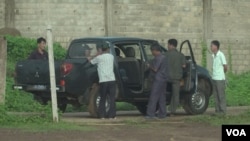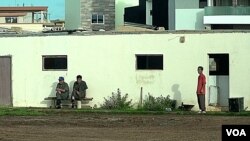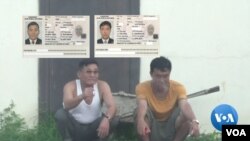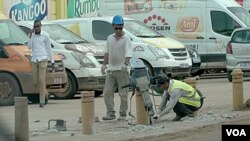North Korea has quietly reopened a construction firm in Senegal in an apparent violation of United Nations sanctions targeting Pyongyang’s nuclear programs, VOA Korean has confirmed.
At least 31 North Koreans are working at the firm, Corman Construction & Commerce Senegal Sural (CCCSSS), according to interviews and official documents reviewed by VOA Korean.
Under a series of sweeping sanctions enacted two years ago, the U.N. prohibited member states from conducting most business activities with North Korea. The sanctions also prohibited member states from allowing in new North Korean workers and required any North Korean workers in place be expelled by the end of 2019.
Senegal told the United Nations Security Council (UNSC) in January 2018 that it had responded to the most recent sanctions by shutting down the North Korean company, Mansudae Overseas Project Group of Companies (MOP).
But documents show that Corman Construction was registered in June 2017 under management of a North Korean national. The company is working on some of the same construction projects that Mandudae Overseas worked on before it was closed.
Reporters from VOA Korean traveled to Dakar, the Senegalese capital, and reviewed business papers, immigration documents and copies of passports identifying the North Korean business activities in the African country. The source of the documents requested anonymity due to fear of reprisal.
On the morning of Sept. 16, VOA Korean reporters watched as a handful of North Korean workers emerged from a lodging compound in Dakar.
They squeezed into a double-cab pickup truck, then traveled for an hour to a factory owned by the Senegalese food processor, Patisen. It is one of three companies in Senegal that have hired Corman Construction for projects.
Outside the factory, North Korean workers squatted on the parking lot pavement. “Are you from Pyongyang?” a VOA reporter asked in Korean. “Yes,” came the response.
The worker said he arrived in Senegal three years earlier. Later, documents reviewed by VOA showed that eight of the 31 workers had arrived more recently. The source said each worker earns about $120 a month after remitting a portion of his wages to the North Korean government.
U.N. and U.S. officials maintain that North Korea obtains hundreds of thousands of dollars per year from these and other remittances. The sanctions are meant to cut off North Korean leader Kim Jong Un’s access to foreign currency that could help finance his nation’s nuclear and missile development program.
Joshua Stanton, a Washington, D.C.-based attorney who helped draft the 2016 North Korean Sanctions Act, said he believes North Korea is violating sanctions.
“Given the December deadline for all North Koreans workers to return home, it’s clear that the UNSC meant to ban all overseas currency-earning operations,” said Stanton. “So, yes.”
VOA contacted the governments of North Korea and Senegal. Neither responded to questions about Corman.
Over the years, North Korea’s support of African movements fighting for independence from European colonial powers in the 1960s has evolved into an income stream for Pyongyang.
In 2017, the U.N.’s Panel of Experts on North Korea issued a report that outlined Pyongyang’s military support of African nations, among them Eritrea, the Democratic Republic of Congo, Angola, and Uganda. The report spoke of how, globally, North Korea “flouted sanctions … with evasion techniques that are increasing in scale, scope and sophistication.”
MOP is the global expansion of the Mansudae Art Studio, which was founded in 1959. It operated in countries such as Angola, Botswana, the Democratic Republic of Congo, Ethiopia, Mozambique, Namibia, and Zimbabwe, building gigantic sculptures, monuments, and national buildings since its establishment in 1970s. North Korea has military ties with some of these countries.
In 2010, Mansudae built a giant bronze statue, the “Monument of the African Renaissance,” on a hill overlooking Dakar to mark the 50th anniversary of Senegal’s independence from France. The Senegalese government paid $27 million for the 49-meter-tall statute.
North Korea's regime has been under international sanctions since 2006, when it carried out its first nuclear and ballistic missile tests.
After Pyongyang conducted two nuclear tests in 2016, the UNSC passed a resolution in August 2017 banning its member states from the “opening of new joint ventures or cooperative entities with DPRK entities or individuals.” The Democratic People’s Republic of Korea (DPRK) is the official name for North Korea.
The UNSC simultaneously forbade member states from authorizing additional North Korean workers, saying they “frequently work in other States for the purpose of generating foreign export earnings that the DPRK uses to support its prohibited nuclear and ballistic missile programs.”
In September 2017, the UNSC passed another resolution urging its member states to close any existing North Korean entities in their territories within 120 days of the resolution.
At the time, most of North Korea’s overseas laborers were working in Russia and China. Since then, those nations have told the U.N. they have sent home tens of thousands of North Koreans.
On Jan. 5, 2018, Senegal reported to the United Nations that it had shuttered MOP, the giant statute builder, adding: “The company was registered as a legal entity under number SN-DKAR-B6903 on 23 April 2008 and operates primarily in the construction sector. The Government of Senegal has systematically refused to issue entry and short-stay visas to or renew previous visas for the company’s North Korean workers. Owing to these measures, the company cannot continue to carry out its activities.”
VOA learned that approximately six months before Senegal reported closing MOP, North Korea had created Corman Construction in Dakar in June 2017. The new company was to replace MOP, which had been sanctioned additionally by the U.S.
VOA confirmed the establishment of CCCSS by reviewing business filings required by the Senegalese government.
Alastair Morgan, coordinator for U.N. Panel of Experts on North Korean sanctions enforcement, told VOA that North Korea has continued to violate U.N. sanctions on export labor.
Asked about the situation in Senegal, a U.S. State Department spokesperson told VOA in an email that all U.N. members “are required to implement U.N. Security Council sanctions resolutions, and we expect them all to continue doing so.”
The U.N. Panel of Experts issued a midterm report in August stating MOP continues to operate despite its sanctioned status. The panel also reminded its member states to send North Korean workers back to their country by December 2019 deadline as a resolution the UNSC passed in December 2017 urged.
Despite these and other sanctions, North Korea conducted multiple missile tests this summer.
Christy Lee contributed to this report originated by VOA Korean.










